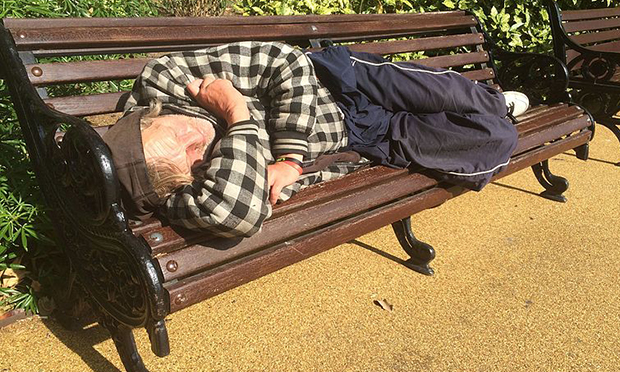Hackney’s homeless denied ‘appropriate’ end-of-life care

Researchers selected Hackney due to its high volume of homeless people. Photograph: Allan Warren
Terminally ill homeless people in Hackney are “falling through the cracks”, according to a new report published today.
Researchers from charities Marie Curie, Pathway and St Mungo’s and NHS body Coordinate My Care worked with 127 homeless people and hostel staff in Hackney, Westminster and Lambeth.
Their findings, published in the journal Palliative Medicine, show many homeless people in these three boroughs are still living in hostels even as they approach death.
The wide-ranging study also revealed hostel staff end up caring for some of the sickest homeless people despite not having the necessary training or support.
University College London’s Dr Caroline Shulman, who led the research, said: “Hostels provide temporary accommodation. They are not designed to meet the needs of seriously or terminally ill residents.
“Hostel staff often struggle to secure additional support from social services or palliative care services for their residents who have complex problems.”
The report says homeless people with advanced ill health rarely receive adequate care, and this results in repeated emergency hospital admissions in the last months, weeks or days of life.
Marie Curie said the study shows “homeless people who are terminally ill are falling between cracks in services, and are not able to access the same level of support as others”.
Simon Jones, the charity’s policy director, said: “This important study highlights that for homeless people, home represents something completely different – a hostel, or on the street. Everyone deserves compassionate care and a dignified death, regardless of where they normally live, or their personal circumstance.”
Professor Steve Field from government health watchdog the Care Quality Commission (CQC) said: “As a GP I have seen how the lack of appropriate and sensitive services can mean that homeless people are denied the compassionate healthcare, dignity and respect that they deserve at the end of their lives.
“This research makes it clear that by working together, healthcare services and the wider system – such as housing, social services and the charity sector – have a vital role to play in improving the quality and co-ordination of care for homeless people as they reach the end of life.
“Everyone has the right to safe, high quality, and compassionate health and social care. Through our inspections we have seen services that are providing outstanding care to people who do not have secure housing but it takes strong, responsive leadership and dedicated staff.
“In the coming months, CQC will be publishing a detailed report making recommendations on how we, as a society, can meet our responsibility to the most vulnerable people in our communities, who are currently being let down at a time when they need help and support the most.”

This is absolutely unacceptable that so many of the most vulnerable people are not being cared for when they most need it.
The Liberal Democrats would introduce a ‘Housing First provider’ in each local authority that would put long-term homeless people straight into independent homes rather than emergency shelters and hostals so we can deal with their underlying problems rather than moving them around constantly.
By increasing support for homelessness prevention and properly funding emergency accommodation, we can end rough sleeping in Hackney and across the country.
The evidence suggests that supporting people and giving them long-term, stable places to stay is far more successful in tackling homelessness than constantly moving them to different temporary accommodation and obviously this would allow authorities to identify those who need care, be that for a terminal illness or other problems affecting their lives such as mental illness or addiction.
It is worth saying that it is a disgrace that despite so many vulnerable people finding themselves homeless that so many council homes owned by the Labour council are lying empty.
as someone who works with hackneys homeless on a daily basis i can tell you now that whilst housing first is a much misunderstood cost cutting trend which works for a minority it is effectively a fast track back to the streets for the more at risk homeless and a fig leaf for cuts to effective intensive services
Hi Steve,
No single model dealing with these complex issues is ever going to have a solution for every homeless person.
The Housing First model deals with the very fundamental problem that a homeless person does not have a home.
Giving a homeless person a home first then allows you to deal with other issues that the individual has and because they are not moving around constantly, it reduces the risk of them falling through the cracks as has been highlighted in this piece by the Citizen.
The Housing First model has had good results elsewhere and is an evidence based policy, I would be interested in hearing your alternative evidence based suggestions for dealing with this crucial issue.
I wonder how much these reports cost the public purse?, just to tell us the blatantly obvious. The people that produced it were all no doubt paid handsomely for stating what we all knew already. Perhaps they could have done away with writing/producing such reports and used the money instead to provide some unfortunate individuals a better place to live!
There is nothing surprising if people who are homelessness or live in hostels go on to die homeless or in a hostel.
But is it true to say the homeless are denied care? It is true to say the are denied support? These people access huge amounts of support every day.